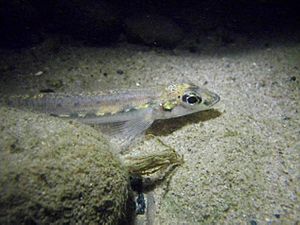Diamond darter facts for kids
Quick facts for kids Diamond darter |
|
|---|---|
 |
|
| Conservation status | |
| Scientific classification |
|
| Kingdom: | Animalia |
| Phylum: | Chordata |
| Class: | Actinopterygii |
| Order: | Perciformes |
| Family: | Percidae |
| Genus: | Crystallaria |
| Species: |
C. cincotta
|
| Binomial name | |
| Crystallaria cincotta S. A. Welsh & R. M. Wood, 2008
|
|
| Script error: The function "autoWithCaption" does not exist. | |
Script error: No such module "Check for conflicting parameters".
The diamond darter (Crystallaria cincotta) is a special type of freshwater fish. It's a small fish that belongs to the darter group. This group is part of the Percidae family, which also includes perches. The fish gets its name because it reflects light like a sparkling diamond, especially when seen at night.
Scientists first described the diamond darter in 2008. It is only the second known member of its fish group, called a genus. The other member is the crystal darter, C. asprella. In 2013, the United States Fish and Wildlife Service officially listed the diamond darter as an endangered species. This means it is at high risk of disappearing forever.
What Does It Look Like?
Diamond darters have 11 to 13 spines on their top fin, called the dorsal fin. They also have 11 to 15 soft rays on this fin. Their bottom fin, called the anal fin, does not have any spines. It only has 11 to 13 soft rays.
Adult diamond darters are usually about 3 to 5 inches (7.5 to 12.5 cm) long. The biggest one ever found was about 3 inches (7.7 cm) long.
Diamond darters look a lot like their relatives, the crystal darters. Both fish are translucent, which means you can see through them a little bit. They also both have olive-colored patterns on their bodies.
However, there are some differences. Diamond darters have a mouth opening that is as wide as or wider than the base of their belly fins. These belly fins are shaped like sickles. Diamond darters also have dark spots in front of their eyes. These spots are separate from the edge of their eye sockets. The diamond darter has fewer spines on its dorsal fin and fewer rays on its anal fin compared to the crystal darter. It also has fewer rows of scales on its cheek (2 rows) and on its gill cover (2 rows).
Where Does It Live?

The diamond darter was first found in several rivers between 1980 and 2005. These rivers include the Cumberland, Elk, Green, and Muskingum Rivers. All of these rivers flow into the Ohio River.
Over time, changes to the rivers and problems with water quality have greatly reduced where the diamond darter can live. As of 2008, this fish is only known to still live in the Elk River in West Virginia. In 2014, there was a chemical spill in the Kanawha Valley, which affected the Elk River. Scientists are still studying how this chemical spill might have impacted the diamond darter population.
See also
 In Spanish: Crystallaria cincotta para niños
In Spanish: Crystallaria cincotta para niños
 | Victor J. Glover |
 | Yvonne Cagle |
 | Jeanette Epps |
 | Bernard A. Harris Jr. |


